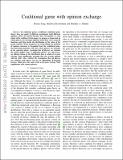Coalitional game with opinion exchange
Author(s)
Jiang, Bomin; Roozbehani, Mardavij; Dahleh, Munther A
DownloadSubmitted version (459.7Kb)
Terms of use
Metadata
Show full item recordAbstract
In coalitional games, traditional coalitional game theory does not apply if different participants hold different opinions about the payoff function that corresponds to each subset of the coalition. In this paper, we propose a framework in which players can exchange opinions about their views of payoff functions and then decide the distribution of the value of the grand coalition. When all players are truth-telling, the problem of opinion consensus is decoupled from the coalitional game, but interesting dynamics will arise when players are strategic in the consensus phase. Assuming that all players are rational, the model implies that, if influential players are risk-averse, an efficient fusion of the distributed data is achieved at pure strategy Nash equilibrium, meaning that the average opinion will not drift. Also, without the assumption that all players are rational, each player can use an algorithmic R-learning process, which gives the same result as the pure strategy Nash equilibrium with rational players.
Date issued
2018-01Department
MIT Schwarzmann College of ComputingJournal
IEEE 56th Annual Conference on Decision and Control (CDC)
Publisher
Institute of Electrical and Electronics Engineers (IEEE)
Citation
Jiang, Bomin et al. "Coalitional game with opinion exchange." IEEE 56th Annual Conference on Decision and Control (CDC), December 2017, Melbourne, Australia, Institute of Electrical and Electronics Engineers, January 2018. © 2017 IEEE
Version: Original manuscript
ISBN
9781509028733
